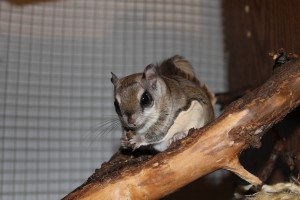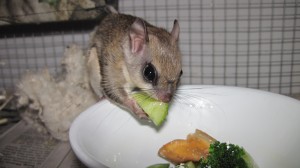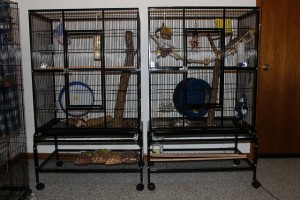Just one look at an adorable Southern flying squirrel, Glaucomys volans, will have many people declaring love at first site, and with their large dark eyes, soft silky gray fur and amazing ability to bond with an owner, it’s no wonder they’re becoming so popular in the pet trade. But before rushing out to buy one, take note: Southern flying squirrels require a commitment to care and in some states may be illegal to own.
The Southern flying squirrel, or SFS, is the smallest of the North American flying squirrels weighing in at only 4 oz. They grow to be about 8-10 inches in length, live upwards of thirteen years and are nocturnal. Their nocturnal nature is just one thing to consider before choosing a SFS as a pet as they will be awake when most people are sleeping, and in the case of the SFS it is very important to spend time with them in order to keep them properly socialized and prevent melancholy.
Legalities of Owning a Southern Flying Squirrel
Owning a Southern flying squirrel is not legal in all states, and in those states where it is legal, owners may still be required to obtain a special permit for their pet. Check state laws thoroughly before acquiring one of these as a pet as some states may issue a fine and confiscate or euthanize a flier regardless of how it was obtained. Owners may also have to show proof that the flier was obtained through legal channels. Removing one from the wild is strongly discouraged.
Diet and Health
Diet is extremely important to the Southern flying squirrel. In the wild this carnivorous squirrel not only eats nuts, berries, and mushrooms, but insects, small eggs, fledglings and carrion as well. Captive flying squirrels are at risk of developing metabolic bone disorder from being fed improper diets. Flying squirrels do best with a balanced diet designed specifically for pet squirrels. Supplement this with hickory nuts, acorns, and vitamin supplements.
Although Southern flying squirrels are generally healthy, before acquiring a SFS find a local veterinarian that will be able to treat a squirrel should it become sick or injured. Don’t wait until the squirrel becomes sick to find a vet because time is of the essence for these small creatures. Veterinarians in states where Southern flying squirrels are banned will not be able to treat a sick squirrel and will most likely euthanize one if it is brought in.
Housing
Fliers are curious and playful by nature, so keeping them engaged is encouraged. Fliers should be given plenty of toys to play with. Non-treated wood or rope toys, pet-safe stuffed animals, and natural sticks or cuttle bones to chew on all make excellent flier toys. Fliers need to chew to keep their teeth worn down so having safe chewable wooden toys is recommended.
Fliers need cages with plenty of room to glide. Cages should be taller than they are wide to give them ample room to climb. In the wild a flier very rarely descends to the forest floor and will spend most of its time as high up in the tree tops as possible. Place several branches in different levels of the cage for climbing and chewing.
Due to their small size and unique gliding ability, flying squirrels can find themselves in all manner of potentially life threatening predicaments. Flier owners must be diligent at all times to prevent accidents. Fliers have drowned in toilets, been stepped on and even electrocuted after chewing on electrical cords. It’s a sad end for a lovable flier and a heartbreaking blow to the owner. Always use caution any time a flier is not safely locked in its cage.
With the proper care and commitment, fliers make wonderful pets. Read on to learn more about the Southern flying squirrel.



